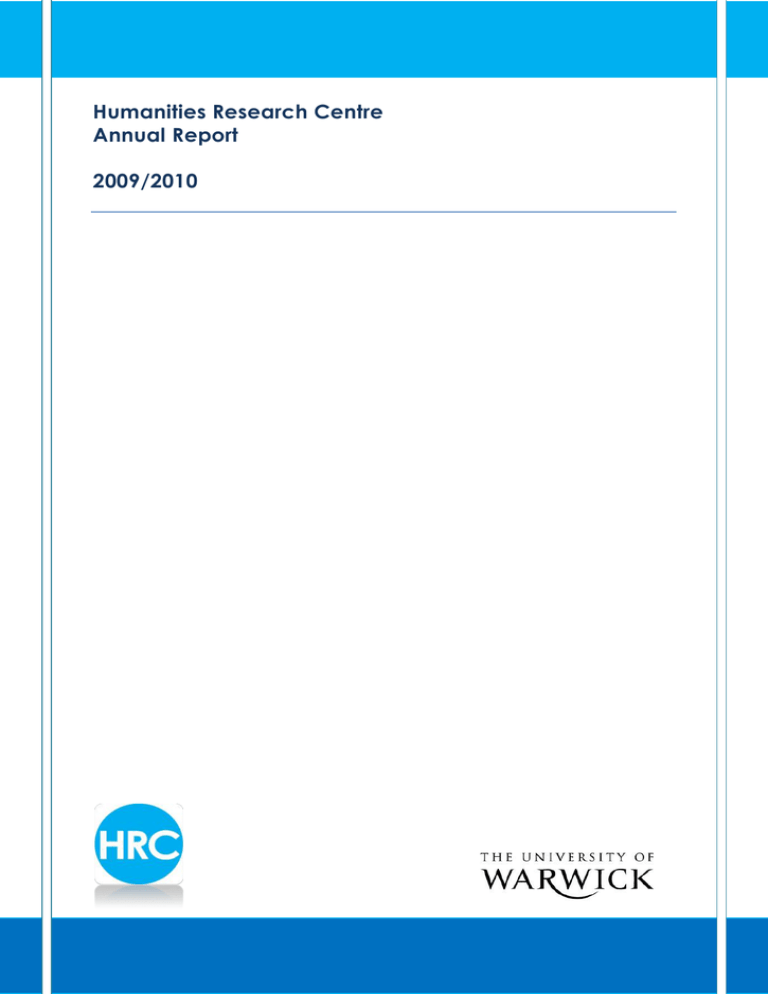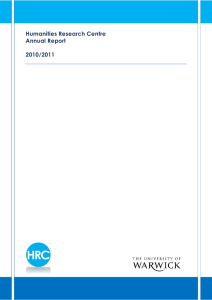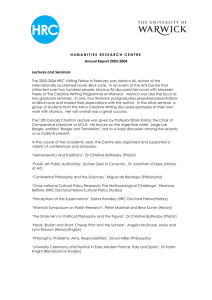Humanities Research Centre Annual Report 2009/2010
advertisement

Humanities Research Centre Annual Report 2009/2010 Conferences, Lectures and Seminars In the course of the academic year, the Centre organized and supported a variety of conferences and events: Mexico at Warwick - Five Centuries of Food, Culture and History Wednesday 25th November 2009 A Tale of Two Cities: Venice and Florence in the Renaissance 8th - 10th December 2009 - Palazzo Pesaro Papafava in Venice Da 'Sodoma' a 'Gomorra': Framing Crisis and Rebirth in Italian Cinema 22nd - 24th January 2010 'Glorious Technicolor, Breathtaking Cinemascope': The Spectacle of Technology in Screen Media Saturday 27th February 2010 Envisioning Community: Space, Place and Translating the Past in 19th and 20th Century Britain Saturday 27th February 2010 Waterborne Pageants and Festivities in the Renaissance 18th - 20th March 2010 - Palazzo Pesaro Papafava in Venice Picture YourSelf - Authorship and Media in Contemporary German Literature Saturday 8th May 2010 Romantic Walking: Representation and Experience Wednesday 12th May 2010 Eighth Warwick Symposium on Parish Research Saturday 22nd May 2010 Renaissance Cultural Crossroads: Translation, Print and Culture in Britain 1473 - 1640 20th - 21st May 2010 Memories of Exile and Return Chilean Scholars in the UK, 1974 – 1985 Friday 21st May 2010 Indo-Caribbean Literature and Culture 1st - 2nd July 2010 The Making of Early Modern Scientific Knowledge: Objects, Spaces, Practices and Epistemologies 2nd - 3rd July 2010 Film - Philosophy III 15th - 17th July 2010 The 18th Donald Charlton Lecture was given on 14th January 2010 by Colm Tóibin, on the cusp of his most recent novel, Brooklyn, claiming the Costa Novel of the Year Award 2009. Hosted at a public event at Warwick Arts Centre, Tóibin read a handful of vignettes from the book, written from the perspective of an Irish immigrant, Eilis, living in New York. The novel captures her experiences in the quirky Irish diaspora, moments of human interaction rife with generosity and warm observations about the community. Talking about his understanding of diaspora, Tóibin claimed that, “Some places won‟t allow you to call them home,” pointing to Eilis‟ attempts to establish a connection in her new environment. The event was chaired by Professor Jeremy Treglown, who drew out Tóibin‟s humour and encouraged the author to let loose in the question and answer session. Showing great energy and a droll wit, Tóibin responded raucously to technical questions, such as his experiences of teaching creative writing as a Visiting Professor at the University of Texas and Stanford University, where he famously banned the use of flashbacks and, for a term, penises – with the exception „perhaps,‟ of references to prostate cancer. He also described his reactions to Irish history as making him want to “howl with laughter,” though with the implication that this might well be the only response to such a complicated mess of politically-contested events. He ended on a note about how the manipulation of Ireland‟s history too often undermines the vitality of the human spirit, which, as Brooklyn shows, is something to be celebrated above all. The HRC Visiting Fellow for 2009-2010 was the writer Francisco Goldman. His latest book, The Art of Political Murder (Atlantic 2008), won the 2008 TR Fyvel Freedom of Expression Book Award from the Index on Censorship and was shortlisted for the CWA Gold Dagger for NonFiction 2008 and for the Warwick Writing Prize in 2009. The Art of Political Murder is the story of the seven-year investigation into the murder of a Guatemalan Bishop. Francisco Goldman was „In Conversation‟ with Maureen Freely and Jon Lee Anderson in March 2010. He discussed his three novels, that explore personal and historical links between Guatemala and the United States, and also his non fictional work that analyses the brutal conflicts in Central America since the 1980s, the uneasy peace agreements, and the continuing violence and human rights abuses in those countries. He also read extracts from his new novel Say Her Name. This event, which attracted an audience of over 100, was followed with a book signing and wine reception. The Interdisciplinary Research Seminar Series Film and History The HRC Interdisciplinary Seminar Series for 2009-10 was dedicated to the theme of Film and History. Two seminars took place in the Autumn term followed by a one-day workshop in May. Hollywood and American History Ed Gallafent (Film and Television Studies, Warwick) In search of the ordinary G.I. Joe Trevor McCrisken (PAIS, Warwick) What have historical films ever done for us? Hollywood and Postwar Europe David Ellwood (University of Bologna) American cinema and postwar reconstruction Peter Kramer (UEA) The German reception of Chaplin’s The Great Dictator Where Does History Happen? This event brought together historians of the audio-visual in and from different contexts, and maps some of the changing locations of the history of the moving image in the twenty-first century. Issued discussed included: the relationship between new „digital debates‟ and older theorisations of the moving image the new audio-visual scholar: wiki user, connoisseur, archivist, cultural historian, social network user? the status of the local, the national and the everyday within histories and geographies of the moving image questions of cultural heritage: how and where are diverse cultural histories represented and negotiated in contemporary screen history? teaching and research practice: where is the archive now? Contributors included: Hans-Michael Bock (Cinegraph Research Institute, Hamburg), Erica Carter (Warwick), Ben Highmore (Sussex), Adrian Martin (Monash, Melbourne), Therese Davis (Monash), Sarah Street (Bristol), Helen Wheatley (Warwick). Newsletter The 7th issue of the HRC Newsletter was published. The Newsletter showcases research being carried out by the arts and humanities community at Warwick as well as advertising forthcoming HRC events. It is mailed out to the arts and humanities departments of every major UK HEI as well as other arts organisations and many overseas institutions. Doctoral Fellowships This year the Centre was able to sponsor three (internal) Doctoral Fellowships. The Fellows contribute to the life of the HRC by organising a one-day postgraduate interdisciplinary conference and are given financial support for their PHD dissertation research. The fellowships were awarded to: Lucy Allwright and Tara Morton (History) ‘Envisioning Community: Space, Place and Translating the Past in C19 and C20 Britain’ Anna Sloan (Film and Television Studies) ‘Glorious Technicolor, Breathtaking Cinemascope: Technology and Spectacle in the Screen Media’ Jeanine Tuschling (German) ‘Picture Yourself – Authorship and media in contemporary German literature’ Future Projects 19th Donald Charlton Lecture We look forward to welcoming Professor Samik Bandyopadhyay from JNU in November 2010. The HRC decided, at its meeting in Summer Term 2010, to search for both its Charlton Lecturer and its Visiting Fellow from among Warwick‟s international strategic partners. We are delighted that Prof. Samik has been able to accept our invitation. His lecture will follow on from a joint Warwick/JNU symposium being organized by the School of Theatre, Performance and Cultural Policy Studies. Professor Samik Bandyopadhyay was Regional Editor for Oxford University Press, Calcutta, 1973-82. He has lectured in the USA, Germany, Sri Lanka, and Bangladesh. He has translated plays and fiction by Badal Sircar and Mahesweta Devi, and reconstructed for publication film scripts for films made by Shyam Benegal and Mrinal Sen. He is also a well known theatre critic writing widely in the Indian press about theatre and performing arts. The HRC Visiting Fellow for 2010-2011 is Professor Peter Lake (Vanderbilt). Professor Lake is a leading early modern scholar. He is currently writing a book on Shakespeare's history plays and another about Samuel Clarke‟s collections of godly lives. Prof. Lake visited Warwick in June 2010 as part of an IAS Vacation School and led a seminar, along with Dr. Femke Molekamp (Early Career Leverhulme Scholar in the English Department), on the topic of „the natural and the strange‟ in the period 1550-1650. Prof. Lake‟s designation as the Visiting Fellow for 2010-11 is part of the HRC‟s efforts to forward the University‟s international strategy by exploring links and collaborations with its designated strategic partners. During his visit Prof. Lake will offer a public lecture, a postgraduate seminar, and office hours for individual student consultation. Forthcoming Conferences include the Doctoral Fellowship winners: David Hitchcock (History) ‘Idle and Disorderly Persons’: The Representations and Realities of the Mobile Poor in Early Modern England Dom Holdaway and Filippo Trentin (Italian) The Postmodern Palimpsest: Narrating Contemporary Rome Postgraduate Scholars Program This program, to kick off in Autumn 2010, will gather a group of postgraduate research students (participants will have successfully upgraded to the PhD), one or two from most departments in the Faculty (including Philosophy), who will meet regularly throughout the academic year to share work in progress, garner peer feedback and support, and work towards the production of a joint project that draws on their separate projects but creates a coherent whole. This may take the shape of a themed symposium, a piece of public art, a collective piece of written work, some combination of text and image, or any appropriate outcome as devised by the group. In its inaugural year, the group will be encouraged to draw into their joint work, or use as an organizing principle, the theme of the Warwick Prize for Writing 2011, „Colour‟. Members of the program will be designated HRC Postgraduate Scholars. They have been provided with a dedicated laptop and printer and the HRC will supply a lockable cabinet for the secure storage of project materials. The Scholars will have a budget from which small personal research budgets may be designated and which will cover costs associated with the group project. The group will also have the opportunity to work virtually, and perhaps in person, with a similar group of postgraduates affiliated with the Robert Penn Warren Center for the Humanities at Vanderbilt University. In the first instance this might take the shape of teleconferences at which students can present their work for comment and peer feedback. If funding permits, the two groups may work towards a joint meeting either at Warwick, Vanderbilt, or Warwick‟s Venice Palazzo. The Vice-Chancellor has volunteered a space in University House for the display of any artwork that the group may devise. HRC/Warwick Series in the Humanities: Pickering and Chatto Publishers At a period of extraordinary political undermining of the value of the humanities to public life it is more than ever imperative that arts and humanities scholars reaffirm the value of the discipline in scholarly and accessible terms. This series will do just that by publishing the varied and multidisciplinary outcomes of the projects funded by the HRC. By definition, all conferences and seminars sponsored by the HRC are interdisciplinary, and by design such events draw from the full gamut of the Faculty‟s strengths: literary, historical, linguistic, visual, philosophical; ancient and modern of all temporalities; British, European, and global. Events typically highlight the work of scholars established, new, and in training; the work itself is inflected by modes and models of thinking that show the humanities as alive, well, and intimately and intricately embedded in the wider culture. The Warwick Series in the Humanities will thus showcase the best current work while at the same time illustrating innovative, even experimental approaches to interdisciplinarity. Publishing an average of five titles a year, the series will be a vibrant example of the creativity, relevance, and intellectual availability of the humanities. All conferences receiving funding from the HRC (including doctoral fellowship conferences) must normally give first refusal for publication to the Series. Proposals will be read by the Director plus 2 members of the HRC Committee, drawing on specific expertise to ensure that they are knowledgeably evaluated. In addition, the Series will accept proposals from the Faculty community in general, with the proviso that any such proposals are for studies that are interdisciplinary. Concluding Remarks During 2009-2010 the HRC has discussed ways in which it might become a more visible presence within the Faculty of Arts and the University in general. The new initiatives described above are first steps, and we look forward to taking this further in 2010-11. As Director, I must record my and the Faculty‟s thanks to the HRC Secretary, Sue Dibben, whose helpfulness and wide-ranging knowledge are essential to the ongoing functions of the HRC. Sue has taken the new developments of the HRC in her stride and has ensured that the first year under a new director has run seamlessly. Jackie Labbe, July 2010.



